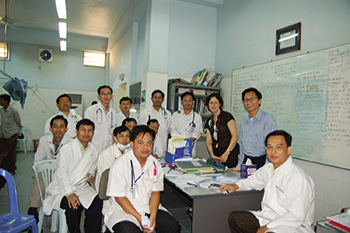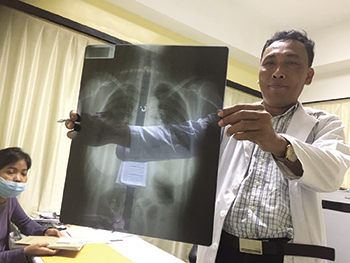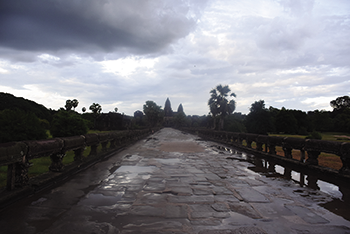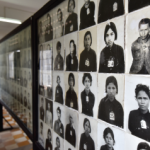
Dr. Seligman (black shirt) teaches trainees in the hospital’s emergency department in 2007.
In 2001, Victoria Seligman, MD, MPH, was vacationing in Vietnam. While traveling by train, she met a student from Yale University who was working on the school’s Cambodian Genocide Program, which documents the atrocities that occurred in Cambodia between 1975 and 1979 under the Khmer Rouge regime. Approximately 1.7 million people—representing 21% of the population—were slaughtered. Roughly 30 doctors remained alive in the entire country.
“It was a fluke meeting this woman,” says Dr. Seligman, assistant professor of medicine at the University of Colorado Health Sciences Center, Denver. “I didn’t know anything about Cambodia and became intrigued.”
Finding a Way to Help
Dr. Seligman will never forget the horror stories she heard from the woman on the train. They reminded her of the stories shared by Jewish Holocaust survivors in her hometown, New York. She vowed to find a way to help.
In 2003, Dr. Seligman searched online for volunteer opportunities in Cambodia and discovered Health Volunteers Overseas (HVO), a nonprofit that builds healthcare capacity in developing countries. She emailed the organization, inquiring about opportunities in Cambodia, and received a same-day response: “Are you interested in starting an internal medicine program?”
A Clinic Established

South gate tower of Bayon Temple, Angkor Thom, Cambodia.
It didn’t take much to persuade her. In 2004, she traveled to Cambodia as the HVO volunteer program director to find a sustainable site for a clinic and establish a training program for volunteers, in general, and specialty medicine, including rheumatology, in particular.
“At the time, Cambodia was like the Wild West,” she says, citing the lack of doctors, medical training opportunities or even federal regulations governing healthcare or providers. “There was no such thing as specialty training or clinics in the country. Even now, specialty medicine is still in its infancy, despite the great strides we’ve made.”
Dr. Seligman helped develop the country’s first rheumatology clinic in Phnom Penh. She says it took approximately five years for the program’s physicians to become self-sufficient in rheumatology.
The clinic was housed in the Sihanouk Hospital Center of Hope complex, supported by Hope International. Initially, a daily lottery system had to be implemented given the large number of patients who traveled to the clinic for much needed care. However, that has since evolved to a sliding scale payment system that enables the very poor to receive free care.
Back then, Dr. Seligman says, nobody had smartphones or internet access. Nobody even had a dialysis machine. There were no specialists. She says the medical staff, who were mostly younger than 40, had a “huge fear” of using any complex medications, such as methotrexate, because they didn’t know how to prescribe or monitor them.
Game Changer
Within the next five years, the rheumatology clinic turned a corner. Khun Rithya, MD, a senior physician at the hospital, was sponsored to attend international rheumatology conferences and training programs and then brought that knowledge back to his staff of eight, who handle inpatient, outpatient and emergency department services.

Dr. Rithya, who manages the rheumatology clinic, examines a patient’s X-ray.
Dr. Seligman says the education level of the clinic’s physicians has grown exponentially, as has the clinic’s capacity. Originally, there was just one building. Now there are two. Imaging technology, such as computed tomography scanning, is now available on site.
Although tremendous knowledge gains and improvements have been made, enormous barriers to the delivery of healthcare remain, she says, adding that this population is predisposed to certain rheumatic conditions.
“At least 30–40% of the rheumatology patients are young women with severe lupus or connective tissue disease,” Dr. Seligman says. “The costs for prescription drugs are high, and there are always questions about how to balance rheumatic diseases with infections, like TB [tuberculosis] or malaria.”
Since that first visit in 2004, Dr. Seligman has visited Cambodia about 10 times. During her biennial visits, Dr. Seligman still delivers care, but now she acts primarily as a rheumatology consultant. The most difficult challenge is helping children or young adults who are handed a death sentence when in end-stage disease.
“The lack of dialysis access is still heartbreaking and a travesty,” says Dr. Seligman, adding that systemic lupus patients are often young women with severe kidney disease. “We can’t level the playing field even with the newest medications. We have to contend with all of these other elements of healthcare delivery in a country that is so fractured.

A portion of the Angkor Wat Buddhist temple complex in northern Cambodia.
“There’s so much to learn from people who practice in a low-resource setting,” she says, adding that this experience has not been a one-way street. “It was like working in the early days of medicine, when physicians took care of each other and their patients, working together as a family.”
A Transcendent Experience
Looking ahead, Dr. Seligman hopes to involve the next generation of rheumatologists in these types of volunteer programs. “This program has dramatically changed my life for the better,” says Dr. Seligman, explaining that it has helped her learn about pathologies uncommon in the U.S. and build relationships with clinicians from around the world. “The most vulnerable patients are benefiting from knowledge that physicians here take for granted. But just as important, the overall experience transcends medicine.”
Carol Patton, a freelance writer based in Las Vegas, Nev., writes the Rheum after 5 column for The Rheumatologist.
About Dr. Seligman
In 1993, Victoria Seligman graduated from the Icahn School of Medicine, Mount Sinai, N.Y. Four years later, she completed her residency in internal medicine at the University of Colorado Health Sciences Center and then her rheumatology fellowship at the University of California, San Francisco, in 2001. In 2013, she obtained a Master of Public Health degree at Harvard T.H. Chan School of Public Health, Boston, with a global health concentration focusing on strengthening health systems.
Dr. Seligman is a rheumatologist with UCHealth (Steele Street Medical Center), Denver, and an assistant professor of medicine at the University of Colorado, Denver.


